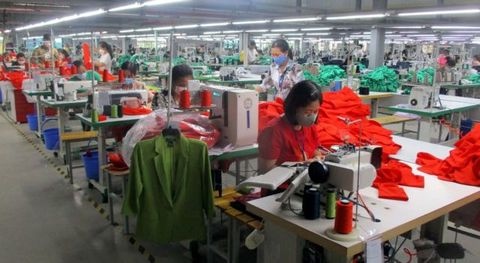Techcom trust debuts on HOSE
Techcom trust debuts on HOSE
Techcom Viet Nam Real Estate Investment Trust (TCREIT) made debut on the HCM Stock Exchange (HOSE) on Monday under the code FUCVREIT at a par value of VND10,000 (44 US cents) per fund certificate.

Five million FUCVREIT fund certificates were floated on the southern bourse, without a specific due term for the fund’s being traded. Changes in the due term will be decided by investors’ resolutions.
HOSE said in a statement that this was also the first domestic-invested fund in Viet Nam’s securities market. The trust fund was founded by the Techcom Capital Co Ltd (TCC), an investment arm of Techcombank.
Ending the first session, its price closed at VND12,000 apiece with 8,330 fund certificates exchanged.
The investment trust was founded as a closed-end fund with initial capital of VND50 billion (US$2.22 million). The fund expects to increase its capital in the future to meet investors’ demands when targeting potential real-estate projects.
By making investments in Techcom Capital’s property investment trust, domestic and overseas investors can indirectly own part of potential real-estate projects and receive constant earnings from those projects without spending money on direct investments in the projects.
In addition, with the fund’s trading on HOSE, investors can buy and sell fund certificates more easily, compared to trading in a real-estate project.
A REIT fund is founded by investors’ capital when they purchase fund certificates and authorise the fund management board to supervise their shares. A real estate investment fund often spends most of its net asset value (NAV) investing in real-estate projects and real-estate companies.
The domestic real estate investment fund has a long-term investment strategy focusing on property projects, such as office buildings, hotels, resorts and shopping centres, which generate constant earnings for the fund from leasing and business activities.
The fund will also consider making investments in projects, such as apartment buildings and housing, which are developed by reputable institutional developers and have high possibilities of price increases, to benefit from selling products in those projects.
In Viet Nam, there are some foreign-invested real-estate investment trusts, such as Vinaland by the VinaCapital, VPF by the Dragon Capital and VPH by the Saigon Asset Management. These funds mobilise capital from overseas investors to purchase stakes in Viet Nam’s real-estate projects and property stocks, after which the funds will be listed on overseas stock exchanges.
According to current regulations, of the total NAV, a REIT must spend at least 65 per cent investing in real-estate projects and property stocks and, at most, 35 per cent investing in other types of assets, such as deposits, bonds and securities.
When the fund seeks capital via an initial public offering (IPO) and/or increases its capital, investors can purchase more fund certificates by making payments in cash or they can contribute their stakes in real-estate projects to receive the amount of certificates that are of equal value to the stakes in property projects.
This could become a new tool to help investors offload their stakes from real-estate projects by selling their fund certificates, if the projects have low trading liquidity in the property market.

























